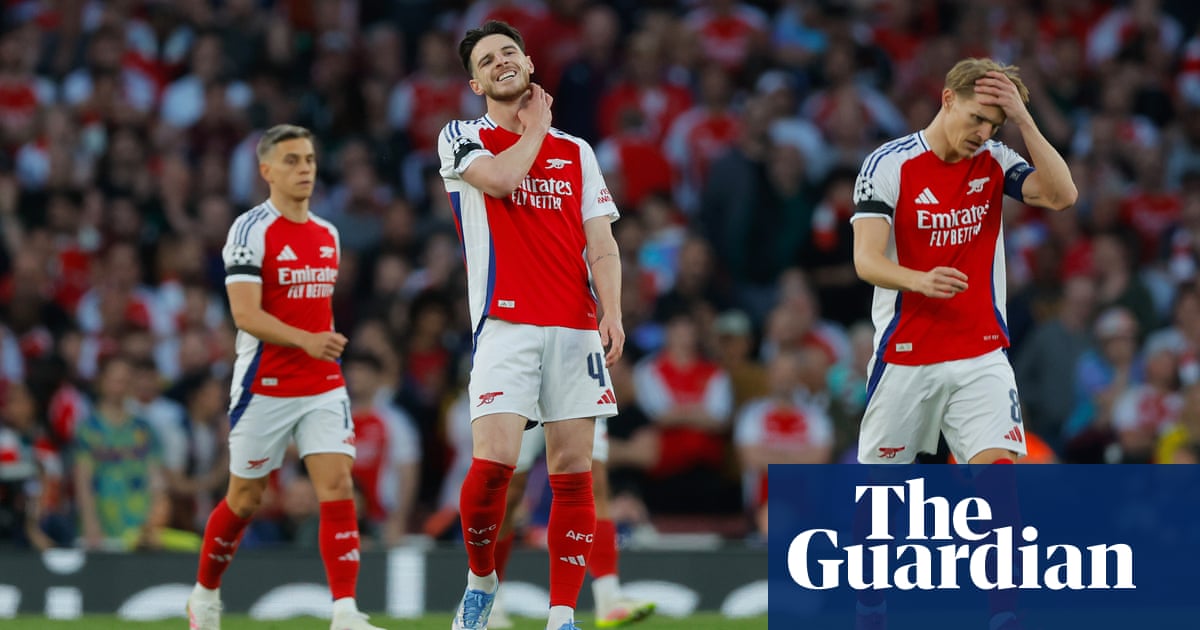Reasons to be cheerful. Hmm. Let’s see.Well, it’s only 1-0. There’s that. And this is a significant achievement given Arsenal were basically suffocated in the opening 20 minutes of this semi-final first leg, unable to breathe in their own stadium, stretched thin, starved of air and light by the deep blue machine of the Paris Saint-Germain press.
In those moments PSG just seemed to have more players in every sector, to be self replicating, João Neves appearing at the shoulder of every teammate like a ghostly butler. In the process Arsenal’s own aggressive approach was entirely disrupted by PSG’s combination of physical pressure and just making you chase, filling your legs with lactic acid, fogging the brain.
There is no shame in this. PSG are a seriously good team, stacked with perfectly-pitched players for Luis Enrique’s system. And they really should be this good, to the extent the opening act of Qatari ownership already feels like a case of mucking about, a Brewster’s Millions approach to team building.
Arsenal had never lost in five previous meetings with these opponents. But they also hadn’t played this version, the new, serious, long-hard-look-in-the-mirror iteration. This is a PSG that say, yes, we’re still a project club. But the project here is work, graft, soulfulness, elite humility, like Prince William in shirt sleeves at a homeless shelter.
It works too. When they play like this PSG already look like the best team in Europe. Here the most interesting part was the way they took away Arsenal’s own superpower, intensity, work and will, out-Arsenaling Arsenal on their own turf.
The Emirates had been a lovely soft place at kick-off, the sky above the lip of the stand a cool powder blue. Hailstones might have worked better. Arteta had called for Big Energy from the home crowd. He always calls for Big Energy. Unless specifically stated otherwise, it is safe to assume Big Energy is required. Here Arteta even appeared on the big screen saying “I need that connection”, coming on like a cross between a world war one recruitment poster and a slightly disturbing dating app reel.
Big Energy! In the pre-match huddle Declan Rice was caught on the TV feed saying: “If we don’t have the ball we die.” In the event PSG scored inside four minutes, and it was more a kind of euthanasia, a goal that came from keeping the ball, making Arsenal drift and become a little slack, cue for a swift pass to Ousmane Dembélé, who turned and just kept running, finding no resistance, a relax of air in front of him.
The ball was fed to Khvicha Kvaratskhelia, then back to Dembélé, who shot low into the corner. At that point Arsenal had made a total of three passes. Martin Ødegaard, Rice and Mikel Merino were all yet to touch the ball.
Rice will be will be criticised for the space Dembélé found. He was doubling up on Kvaratskhelia when he should have held his position. The wrong choice, but still a choice. And there is danger everywhere in these opponents.
The real problem came in the minutes that followed as Rice just couldn’t use his running power from a deeper position, and as PSG’s hyper-drilled midfield made every passing sequence feel like it was being dug out of some unforgiving rock.
Sign up toFootball Daily
Kick off your evenings with the Guardian's take on the world of football
after newsletter promotion
The game was always likely to be defined by the central wrestle. This is PSG’s superpower now, the pre-drilled swarm whenever possession is lost, a tactic that is impossible unless every player is programmed to carry it out, and which simply wasn’t going to wash while the defining image of the club was Neymar in a leopard fur thong staging his own 72-hour pre-match ice dance disco party inside a palace built entirely from marshmallows.
Neves is the embodiment of the new pressure, a player who seems to be always in contact, wound up to a kind of tackle-fever by his manager. Luis Enrique had appeared on his touchline in a de luxe black windcheater and white trainers, looking like the bass player from a seminal New York punk band here to give a talk on male wellbeing. Most disconcerting for Arteta was how much he seemed to be enjoying those early exchanges.
PSG aren’t a good team to go 1-0 down to in the fourth minute. They will simply suck the ball away from you. Counterpunches have to be stored away, adrenaline swallowed. Arsenal did get a foothold via the legitimate tactic of loading the ball into the box, and from Myles Lewis-Skelly stepping into midfield and giving what was an outstanding performance in context.
Otherwise this was just a night when the stitches began to show. Arsenal missed Gabriel because of course you miss Gabriel and all the football he stops happening. They missed players they never signed, the bullocking central presence who might have headed Bukayo Saka’s cross into the net just before half-time.
Mainly they missed Thomas Partey’s ability to break a midfield press, and his related liberating effect on Rice. This isn’t over. PSG have their own frailties. They also have super strengths, a supremely loaded squad and a Big Energy intensity that outmatched Arsenal’s own here.
